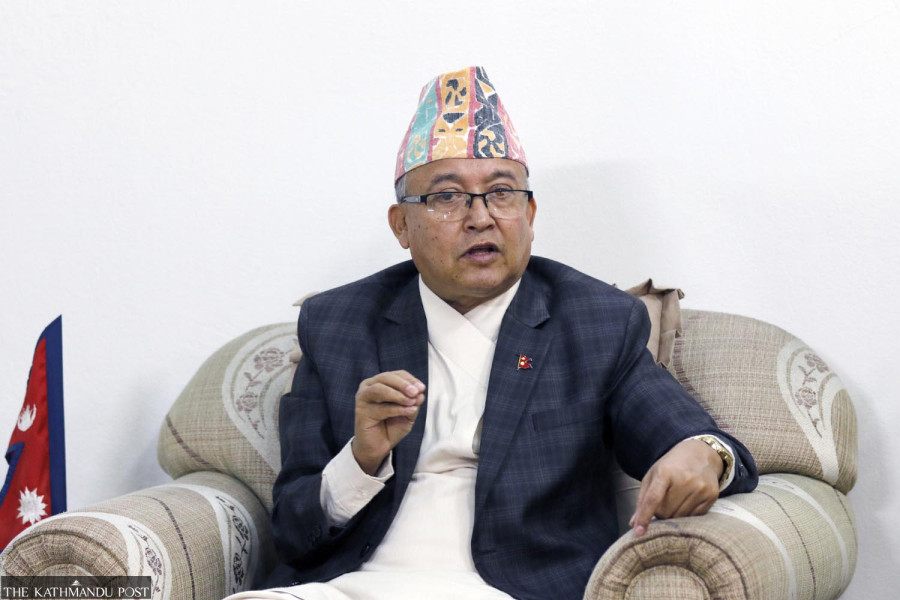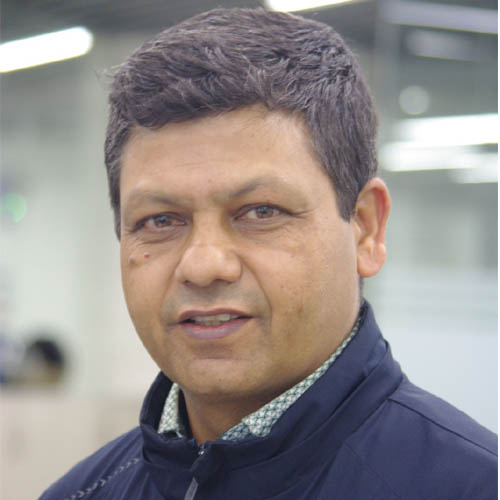Interviews
‘The final election results will be out by December 8’
‘All candidates, no matter what their background, are equal before the commission, and it won’t spare anyone if there are complaints with substantive evidence.’
Thira Lal Bhusal & Binod Ghimire
Close to 18 million voters will get an opportunity on November 20 to elect 275-strong House of Representatives as well as 550 members to the provincial assemblies. The Election Commission of Nepal is in its final preparations. In an interview with the Post’s Thira Lal Bhusal and Binod Ghimire, the Chief Election Commissioner Dinesh Kumar Thapaliya discussed what he has been doing to ensure the elections are free and fair. Here are excerpts from the interview.
How are you preparing for the big day?
The preparation for the voting day is in its final leg. We are currently focused on four issues. First, deploying trained polling officers with necessary materials at their respective polling centres. Second, is the decentralisation of the security forces from the districts to the respective polling centres. The process of their deployment has already commenced to give a feeling of security to each household and each voter. This period is sensitive in terms of code of conduct violations and spread of disinformation, misinformation and hate speeches. We are keeping a close eye on controlling them, which is our third priority. Lastly, we are creating an environment to ensure voters reach polling centres without any hurdles and cast their votes freely and in a peaceful manner.
You talked about proper security arrangements. What is the commission doing to avoid incidents of rigging, like what happened in Bajura in local polls?
We have prepared different strategies with a goal that no re-polling is required at any of the voting centres or booths. A thorough study has been done about the security hurdles at different centres and booths in the previous elections. We have taken into consideration the categorisation by the Ministry of Home Affairs regarding the sensitivity of the respective polling centres and booths. Special security arrangements have been made in the places identified as problematic.
Separate teams of Nepal Police, Armed Police Force and Nepal Army will hold patrols for around a week to give a sense of security. Similarly, we have requested respective local governments to clear the roads leading to polling centres. On the voting day, the voting patterns and the security situation will be analysed from early morning and necessary action taken to avoid any unwanted incidents.
I have personally requested the top leadership of political parties to direct their cadres and leaders to abide by election laws and not engage in any activities that undermine the elections’ impartiality. In addition, reserve forces will be kept on a standby to curb every activity that poses a threat to free and fair elections. We have set up a command unit led by a joint-secretary from the Ministry of Home with representation of senior officials from all security agencies for immediate action, whenever necessary.
The commission is conducting surveillance on misinformation, disinformation and hate speeches through social media. What is it doing to control hate speech by party leaders and candidates?
Character assassination and attack on the morality of others is legally barred and is liable to action. The local administration has the authority to proceed in acts of criminal offences. However, the process for action can only begin if there are complaints. What we feel is that the leaders aren’t taking hate speeches against them seriously. They are taking it easily and are making no complaints. We cannot take suo moto action in such cases. It seems making allegations against each other has become a part of the political culture. Having said this, I firmly believe that such a practice must end.
There are allegations that the commission is selective in enforcing code of conduct by largely targeting independents and candidates from small parties. What do you have to say?
We have a decentralised mechanism when it comes to enforcing election laws and the code of conduct. The respective district-level election offices are the ones to begin action in such incidents. All the district offices might not have been equally active. In addition, action is taken when we get complaints with evidence. All candidates, no matter what their background, are equal before the commission and it won’t spare anyone, if there are complaints against them with substantive evidence. The commission isn’t selective.
Why are the commission’s actions limited to seeking clarifications? When are you going to take stern measures?
Seeking clarification in itself is the beginning of action. Whether or not any further action is required, depends on the clarification from the accused. We have issued warnings and even fined some candidates and their supporters after finding that their clarifications were not satisfactory. We are currently studying dozens of clarifications. The decisions on the complaints filed until November 16 will be taken by November 19, a day before the voting.
There are three steps of action in addition to seeking clarification: issuing warning, fine and scrapping the candidacy. But any action, there must be concrete proof to establish wrong-doing. The commission is careful that its decisions are not overturned by the Supreme Court
What about the decision to scrap the candidacy of Toshima Karki?
The decision was taken after a thorough study of previous decisions by the commission and the court’s ruling from 1991. The commission believes that her position as a member of the Nepal Medical Council is an office of benefit. However, we respect the Supreme Court’s ruling.
How do you defend the commission’s move to stop the “No Not Again” movement?
The commission is clear there are no restrictions on campaigning or saying “No, Not Again.” You could also say “Vote, Again and Again”, for that matter. However, you cannot spread negativity or run a smear campaign against any individual. Our objection was against the negativity spread against many leaders in the name of the “No, Not Again” campaign. I, however, agree that the directive to close its Facebook page was not the right decision. The commission should have only directed to remove the posts that spread negativity against others.
People from places like Upper Mustang are leaving their homes and moving to lower climes due to the cold. Many of them will not be able to vote. Are there any plans to ensure voting opportunities for those in such mountain regions?
We have a report that all the people from one place in Darchula have descended to another place. In such cases, the district election office can shift the polling centre to their temporary settlement and conduct voting there. However, the candidates and the representatives of the parties must agree to that. Establishing a temporary polling centre is only possible if all the voters have migrated to another place. Where the migration is scattered, it is not possible.
In 2017, when the elections were held on November 26, a week later than this time around, there was a problem at only one polling centre in Darchula. We have already moved it this time. I don’t think there will be a problem elsewhere.
What is the commission doing to decrease the share of invalid votes?
The commission has mobilised volunteers at the doorsteps to impart knowledge on proper voting techniques, which was not the case in the local elections. Similarly, we have conducted mock pollings at the local level. Likewise, in every polling centre, we will place a flex board with pictures showing how to vote correctly. There will be similar boards at the ward level. Moreover, it is comparably easier to vote this time. We have separate ballot papers for the direct and proportional systems for both the House of Representatives and provincial assemblies, while the ballot papers will have only the election symbols of the parties that have fielded their candidates.
There are chances of invalid voting, if the voters do it deliberately. We humbly request everyone: Please don’t deliberately invalidate your vote. This won’t do anyone good.
It takes weeks to complete the vote count. Do you have any solutions for a sluggish vote count, if that happens this time?
We are very concerned about the sluggish vote count. This time our target is to complete the vote count under first-past-the-post within three days after the counting begins. The count for proportional representation will be completed within the next one week. This means, all the counting will be completed by the end of November. The commission will come out with the final election results by December 8.




 9.92°C Kathmandu
9.92°C Kathmandu






.jpg&w=200&height=120)






